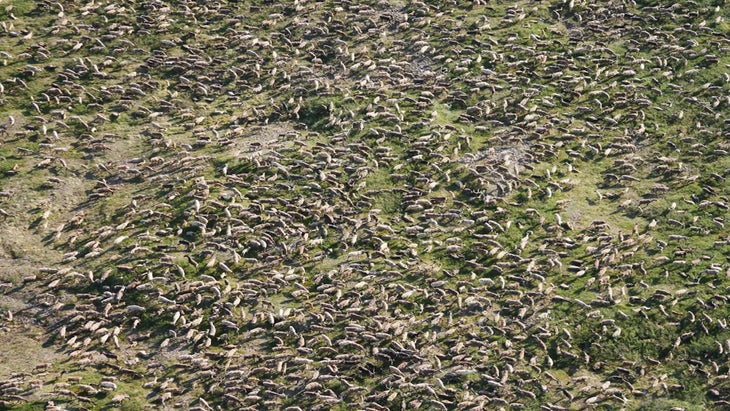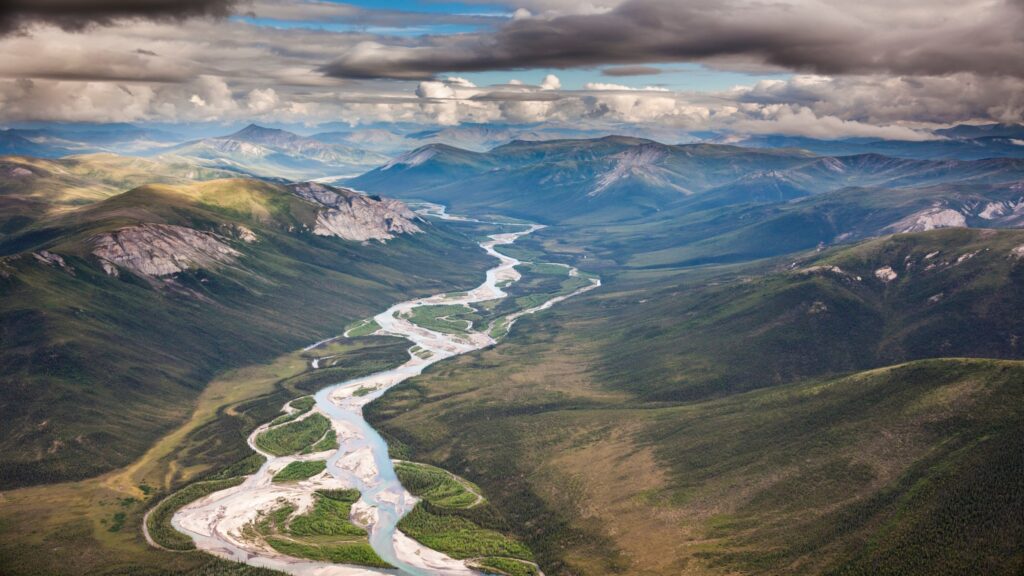Gates of the Arctic is home to one of the largest caribou migrations on Earth
A river flows out of the Brooks Range mountains in Alaska’s Arctic (Photo: Patrick J. Endres/Getty Images)
Published October 7, 2025 04:31PM
President Trump just took a significant step toward opening a roadless stretch of Alaskan wilderness to mining. In an executive order announced Monday, October 6, the president approved the Ambler Road Project, a proposed 211-mile industrial access road to allow mining of minerals, including copper, cobalt, and gold.
The new road will run through Gates of the Arctic National Park and Preserve, the second-largest protected area in the National Park Service (NPS) system. Extending west from Dalton Highway, a 414-mile road system that runs north of Fairbanks to Deadhorse on the Arctic Ocean coast, the road will culminate in Alaska’s remote Ambler Mining District. Most of this ecosystem has remained virtually unchanged by human contact.
“This is no ordinary road—it’s an industrial corridor through intact forests and Alaskan landscapes long enough to connect Washington, D.C. to Philadelphia. Moreover, it would divide the migration route of the Western Arctic Caribou Herd, causing irreversible damage,” said Athan Manuel, director of the Sierra Club’s Lands Protection Program, in a statement.
Gates of the Arctic is one of eight official national parks in Alaska, encompassing more than 8.5 million acres, making it the second largest in the U.S. after the Wrangell-St. Elias National Park and Preserve, also in Alaska. There are no roads into the park, so visitors must fly in a small aircraft often equipped with floats or tundra tires. Because there are no trails into the park, river crossings are also necessary for those hoping to hike in, according to the NPS.
Caribou in the Gates of the Arctic undergo one of the largest migrations in Alaska through the Central Brooks Range to the north slope every summer, and south in the winter. For Alaskans who live a subsistence lifestyle, the National Park Service says “caribou are a lifeline.”

“They are a main subsistence food source for Native residents in Arctic Alaska. Many of these subsistence users identify themselves as “caribou people,” revealing just how deeply rooted caribou are in the history, traditions, and psyche of the people in this region,” writes NPS on its website.
In a statement announcing the decision, the White House said the road will enable access to previously mined minerals and spur the economy of the Last Frontier state. In addition to approving the project, the Whtie House also made the federal government a ten percent shareholder of Trilogy Metals, the mining company. Alaskan Senators Dan Sullivan and Lisa Murkowski have openly supported the reopening of the project.
The gravel road and mining project was approved in Trump’s first term in 2020, but was put on hold after conservation groups sued the administration, citing environmental concerns. The Biden administration later blocked the project after an analysis found future development would threaten caribou, other wildlife, and Alaska Native groups that rely on subsistence hunting and fishing.
The Bureau of Land Management (BLM) will next be required to conduct environmental analysis and review. Because the permit was previously denied, the BLM will also need to provide a different interpretation of the proposal for approval.


